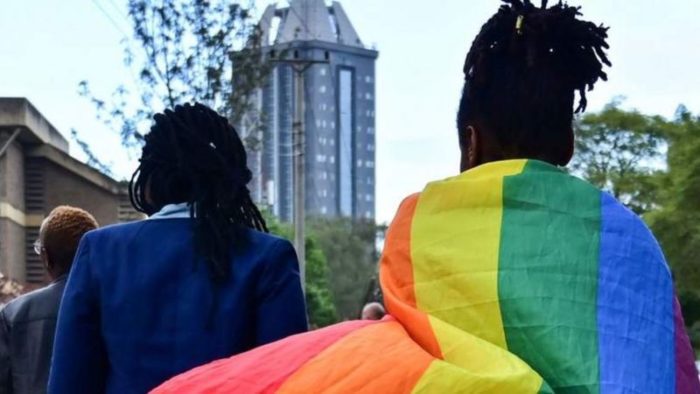
Homophobia is against African notions of ubuntu.
Over the past month, the killings of four gay men have made headlines in South Africa. Lonwabo Jack, a 22-year-old gay man, was killed on his birthday, 18 April. Earlier in April, two more gay men, were killed – Nathaniel Mbele in Vanderbijlpark and Sphamandla Khoza in Durban.
Lonwabo Jack’s killing occurred just two days after advocates for the human rights of lesbian, gay, bisexual, transgender and intersex people (LGBTI) led protests in front of Parliament in Cape Town demanding that the South African government address the countrywide homophobic violence that continues unabated.
The group Justice for Lulu, founded after Andile “Lulu” Ntuthela, a 40-year-old gay man, was killed in the Eastern Cape on 10 April. The group handed a memorandum to Parliament calling, among other things, for an urgent debate on hate crimes. The Gay and Lesbian Alliance of South Africa (GLASA), in turn, called for the government to speed up the adoption and enactment of the Prevention and Combating Hate Crimes and Hate Speech Bill B9 of 2018.
These hate crimes and attacks on the LGBTI community have been ongoing for many years. Homophobia is endemic in South Africa, despite the comprehensive and progressive legal framework, including legal protection for the human rights of LGBTI persons.
As attested to by the ICJ’s recent report, “Invisible, Isolated, and Ignored: A report on Human Rights abuses on Sexual Orientation and Gender Identity/Expression in Colombia, South Africa and Malaysia”, and illustrated by these ongoing attacks, these legal protections do not translate into real protection of human rights in practice.
“South Africa is a heteronormative society where patriarchy is deeply rooted; this contributes to violence and discrimination against LGBTI persons. The view that homosexuality is un-African is held by many. Political and cultural leaders have in the past publicly espoused anti-gay sentiments and this encourages discriminatory attitudes and violence against people based on their real or imputed sexual orientation, gender identity or expression”, said Kaajal Ramjathan-Keogh, Director of ICJ Africa.
Section 9(3) of the South African Constitution provides that the State may not unfairly discriminate directly or indirectly against anyone on the ground of sexual orientation, and the African Charter on Human and Peoples’ Rights (African Charter) grants protection against prohibited discrimination, and entitles every person to equal protection of the law.
Additionally, the African Charter entitles every individual to respect of their life and the integrity of their person, and prohibits torture, cruel, inhumane or degrading punishment and treatment.
In its Resolution on ‘Protection against Violence and Other Human Rights Violations against Persons on the basis of their real or imputed Sexual Orientation or Gender Identity’, the African Commission strongly urged “States to end all acts of violence and abuse, whether committed by State or non-state actors, including by enacting and effectively applying appropriate laws prohibiting and punishing all forms of violence including those targeting persons on the basis of their imputed or real sexual orientation or gender identities, ensuring proper investigation and diligent prosecution of perpetrators, and establishing judicial procedures responsive to the needs of victims.”
Notwithstanding South Africa’s legal obligations, LGBTI persons face significant barriers in accessing justice and effective remedies for human rights violations; particular challenges affect the criminal justice system, resulting in many cases concerning the protection of human rights of LGBTI persons not reaching the courts.
These barriers to access to justice and effective remedies for human rights violations include experiences of discrimination within the criminal justice system, as well as societal homophobia and transphobia. This is in contravention of South Africa’s duties under international, regional and national law to afford every person equal protection of the law.
The Prevention and Combatting of Hate Crimes and Hate Speech Bill needs to be adopted as a matter of urgency. It is important as measure of deterrence and to ensure that perpetrators of hate crimes be brought to justice.
The ICJ condemns the killings of members of the LGBTI community and calls on the South African government to acknowledge the discrimination, hatred and violence that LGBTI persons face every day in South Africa and to act decisively to address these harms.
Progressive legislation is not enough, the criminal justice system needs to be sensitized and educated to eliminate experiences of societal homophobia and transphobia. We echo the demands in this joint statement by multiple human rights organizations in South Africa.
Whatever one’s real or imputed sexual orientation, gender identity or expression, nobody should have to live in fear, everyone should be able to have trust in the police and judicial system. The homophobic acts and sentiments in South Africa are against African notions of ubuntu. Society cannot be free, until all its people are free, and treated with dignity.
Contact:
Nokukhanya (Khanyo) Farisè, Legal Adviser (Africa Regional Programme), e: nokukhanya.farise(a)icj.org
Tanveer Rashid Jeewa, Communications and Legal Officer, e: tanveer.jeewa(a)icj.org